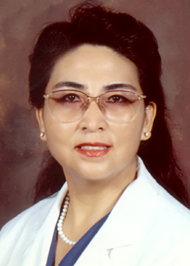Yayun Liang, PhD
Research Associate Professor, Department of Biomedical SciencesInvestigator, Dalton Cardiovascular Research Center
Office Location: 133D DCRC
Office Phone: 573-884-8116
LiangYa@missouri.edu
Research Interests
- Novel targeting and molecular signaling pathways for cancer therapeutics in vitro and in animal models.
- The role of p53 functions in the regulation of tumor growth, apoptosis, angiogenesis, and drug-resistance.
- The role of VEGF regulation of tumor angiogenesis, tumor growth, metastasis, and drug resistance.
Research Description
The concept of specific molecular targeting has been applied to the development of innovative cancer-treatment strategies. At present, two main approaches are available for use in clinical practice: therapeutic monoclonal antibodies and small-molecule agents. Both antibodies and small-molecule compounds are therefore promising tools for target-protein-based cancer therapy. Mutations in p53 or the p53 pathway are thought to play a key role in promoting tumor cell survival and tumor cell resistance to chemotherapeutic drugs. Therefore restoring p53 function in tumors has been pursued as a promising strategy for cancer therapy. Furthermore, Tumor cell survival, growth, and metastasis require persistent blood vessel growth or angiogenesis. A tumor cannot grow beyond the size of about 1mm in diameter without acquiring new blood vessels to nurture it. Hence, targeting tumor blood vessels and tumor angiogenesis has been as a new strategy for treatment cancer.
The aims of Liang's research are to 1) Develop innovative cancer-treatment strategies targeting mut-p53, tumor angiogenesis, and tumor blood vessels with novel antibodies and small molecules in advanced breast cancer models; 2) Define molecular signaling pathways involved in inhibition of tumor angiogenesis and induction of tumor cell apoptosis; and (c) Define the role of VEGF in tumor angiogenesis, growth, metastasis, and drug resistance.
Professional Background
- Obtained PhD in pharmacology, Beijing Medical University (Present: Health Science Center, Peking University), Beijing, China, October 1981.
- Obtained PharmD, Beijing Medical University (Present: Health Science Center, Peking University) Beijing, China, March 1976.
Selected Publications
- Grinter SZ, Liang Y, Huang SY, Hyder SM, Zou X., An inverse docking approach for identifying new potential anti-cancer targets., J Mol Graph Model. 2011 Apr;29(6):795-9. Epub 2011 Jan 19.PMID: 21315634
- Liang Y, Benakanakere I, Besch-Williford C, Hyder RS, Ellersieck MR, Hyder SM., Synthetic progestins induce growth and metastasis of BT-474 human breast cancer xenografts in nude mice.,Menopause. 2010 Sep-Oct;17(5):1040-7.PMID: 20461021
- Liang Y, Besch-Williford C, Benakanakere I, Thorpe PE, Hyder SM., Targeting mutant p53 protein and the tumor vasculature: an effective combination therapy for advanced breast tumors., Breast Cancer Res Treat. 2011 Jan;125(2):407-20. Epub 2010 Mar 27.PMID: 20349129
- Liang Y, Besch-Williford C, Hyder SM., PRIMA-1 inhibits growth of breast cancer cells by re-activating mutant p53 protein., Int J Oncol. 2009 Nov;35(5):1015-23.PMID: 19787255
- Hyder SM, Liang Y, Wu J, Welbern V., Regulation of thrombospondin-1 by natural and synthetic progestins in human breast cancer cells., Endocr Relat Cancer. 009 Sep;16(3):809-17. Epub 2009 Jul 1.PMID: 19570906
- Hyder SM, Liang Y, Wu J., Estrogen regulation of thrombospondin-1 in human breast cancer cells., Int J Cancer. 2009 Sep 1;125(5):1045-53.PMID: 19391135
- Liang Y, Besch-Williford C, Brekken RA, Hyder SM., Progestin-dependent progression of human breast tumor xenografts: a novel model for evaluating antitumor therapeutics., Cancer Res. 2007 Oct 15;67(20):9929-36.PMID: 17942925
- Liang Y, Besch-Williford C, Benakanakere I, Hyder SM., Re-activation of the p53 pathway inhibits in vivo and in vitro growth of hormone-dependent human breast cancer cells., Int J Oncol. 2007 Oct;31(4):777-84.PMID: 17786308
- Liang Y, Besch-Williford C, Brekken R.A., and Hyder, S.M. Progestin-dependent progression of human breast tumor xenografts: a novel model for evaluating anti-tumor therapeutics. Cancer Research 67: 9929-9936, 2007.
- Liang Y, Besch-Williford C, Benakanakere I, and Hyder, S.M. Activation of p53 pathway suppresses proliferation of hormone-dependent human breast cancer cells in vitro and in vivo. Int J Oncol. 31: 777-784, 2007.
- Liang Y, Brekken R.A., and Hyder, S.M. Vascular endothelial growth factor induces proliferation of breast cancer cells and inhibits the anti0proliferative activity of anti-hormones. End Related Cancer 13: 905-919, 2006.
- Liang Y and Hyder, S. M. Proliferation of endothelia and tumor epithelial cells by progestin-induced VEGF from human breast cancer cells: Paracrine and Autocrine effects. Endocrinology 146: 3632-3641, 2005.
- Liang Y, Wu J. and Hyder, S. M. p53-dependent inhibition of progestin- Induced VEGF expression in human breast cancer cells. Journal of Steroid Biochemistry and Molecular Biology 93: 173-182, 2005.
- Liang Y, Eid, A. M, EL Etreby, Lewis R.W., and Kumar, VJ. Mitochondria from TRAIL- resistant prostate cancer cells are capable of responding to apoptotic stimuli. Cellular Signaling, 17: 243-251, 2005.
- Liang Y, Hou M, Kallab A.M., Barrett, J.T., EL Etreby, F., and Schoenlein P.V. Induction of antipriliferation and apoptosis in estrogen receptor negative MDA- 231 human breast cancer cells by mifepristone and 4- hydroxytamoxifun combination therapy: A role for TGFB International Journal of Oncology 23(2): 369-380, 2003.
- Liang Y, EL Etreby M.F., Lewis R.W., and Kumar, VJ. Mifepristone-induced secretion of Transforming Growth Factor-B1-induced apoptosis in prostate cancer cells. International Journal of Oncology 21: 1259-1267, 2002.




